Hello guys, If you are preparing for System Design interview then you may know that System design interviews have evolved. It’s no longer enough to memorize architectures or watch a few YouTube videos before your big day. With lot of layoffs done by FAANG companies like Amazon’s recent 14K people layoff means there is a lot of competitions and you are competing with the very best people out there. Because of this over-supply of best talent, companies have also become very choosy, hence you must prepare really well to crack the interview.
The best engineers now practice designing scalable systems, get feedback on their approach, and iterate — just like they do with data structure problems on LeetCode.
In this changing landscape, two AI-powered platforms have emerged as leading choices: Bugfree.ai and Codemia.io.
Both platforms promise to help you ace your system design interviews, but they take different routes to get you there. Let’s explore what each offers and which one might be the right fit for you in 2026.
While I am a big ByteByteGo fan, I also use these platform to practice System Design problems which is missing on ByteByteGo, I am sure they will get that as well but until now, you need to combine ByteByteGo with one of these resources to prepare really well for System Design interviews in 2026.
A great think is that ByteByteGo is now offering 50% discount on their lifetime plan which is probably the best black Friday deals for developers in 2026. If you are serious about career move this
year, I highly recommend this plan to you.
Codemia.io — Active Practice for Real-World System Design
If you have preparing for System Design interview then most likely you have heard about Codemia.io, a new AI powered platform which allows you to practice System Design questions in LeetCode Style.
Codemia.io was built around one key insight — you can’t learn system design passively. Watching videos or reading blog posts might help you understand concepts, but to truly internalize system design, you need to practice designing systems from scratch and get iterative feedback.
Codemia’s platform lets you pick a problem — say, “Design Ticketing System like TicketMaster” — and walk through the entire process: defining requirements, outlining architecture, designing components, and evaluating trade-offs.
Once you submit your design, the system (and its AI reviewer) gives structured, actionable feedback, pointing out where your design lacks scalability, fault tolerance, or data durability.
They also share editorial solution of most of the problem which is like the ideal solution and you can compare this with your solution to fill the gaps.
What sets Codemia apart is its interactive and iterative approach. You can:
- Choose from 120+ real-world system design problems
- Practice object-oriented design and ML system design
- Receive AI-driven evaluations on each submission
- View other engineers’ solutions and learn alternative approaches
It’s like a LeetCode for system design — but smarter, more guided, and feedback-driven.
And it works: many users from top tech companies like Microsoft, Google, and LinkedIn credit Codemia for helping them bridge the gap between theory and practice.
If your goal is to develop deep intuition for designing distributed systems and get hands-on iterative feedback, Codemia.io offers one of the best environments in 2026.
And, another great thing is that they are also offering over 60% discount on Codemia.io lifetime plan, which is another great Black Friday deal for developers like you and me.
Here is the link to join — 60% Discount on Codemia.io
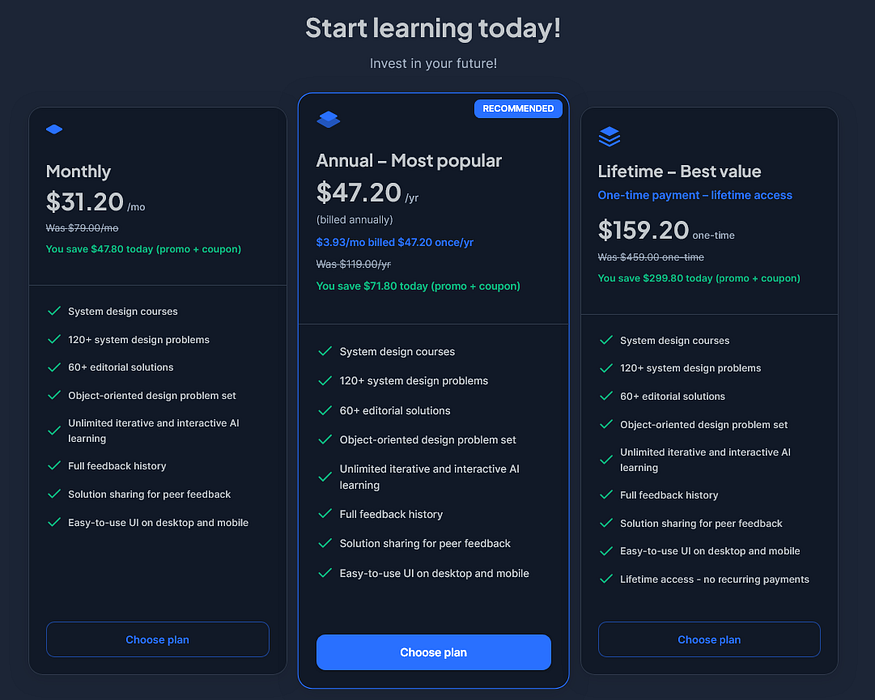
The paid plan will also help you to unlock company wide database of System design question which is real gold for any one preparing for FAANG and MAG 7 companies.
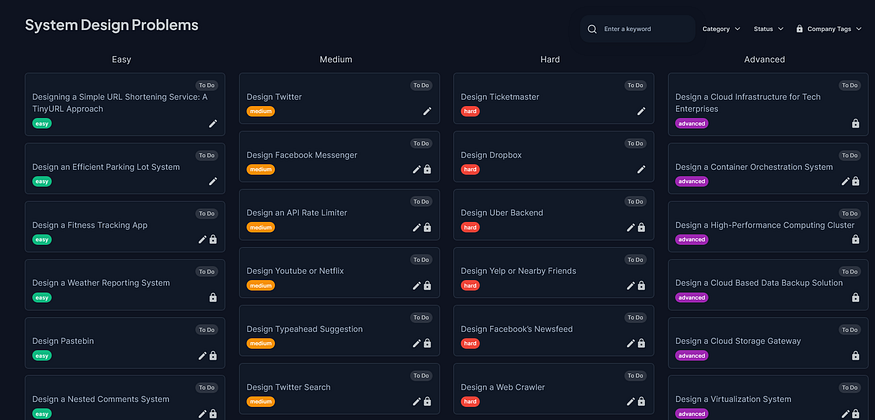
Bugfree.ai — AI-Driven Mock Interviews and End-to-End Prep
Bugfree.ai, on the other hand, positions itself as an all-in-one interview preparation suite. While it also supports system design, its scope is much broader — covering data interviews, object-oriented design, and behavioral questions in one cohesive platform.
What stands out about Bugfree.ai is its AI-powered mock interview engine. You can simulate a real interview session, complete with questions like “Design a Parking Lot” or “Build a URL shortener.”
The system evaluates your answers, gives feedback, and even tracks your progress across multiple rounds.
Here’s what Bugfree.ai brings to the table:
- 200+ system design problems with real interview patterns
- AI mock interviews for design, data, and behavioral rounds
- 500+ curated data interview questions
- Guided frameworks for metrics, SQL, and A/B testing
- 1000+ real interview experiences from companies like Google, Meta, and Amazon
If Codemia is designed for deep skill-building, Bugfree.ai is optimized for interview readiness. It ensures that once you’ve learned the fundamentals, you can simulate actual interview environments and refine your performance.
The platform’s users have landed roles at top companies like Netflix, Microsoft, and Stripe — thanks to its realistic interview simulations and targeted AI feedback.
And, the best thing is that they come up with AI Mock interview which is a game-changing feature to prepare well. When we talk lout and explain like in real interview scenario, we not just understand our concept better but also learn to articulate our answers.
If you want AI mock interviews on System Design then I highly recommend you to join Bugfree.ai in 2026. They are also offering over 40% discount on their lifetime plan, another awesome Black Friday and Cyber Monday deal for developers preparing for System Design interviews in 2026
here is the link to join — Bugfree.ai Lifetime Plan with 40% discount
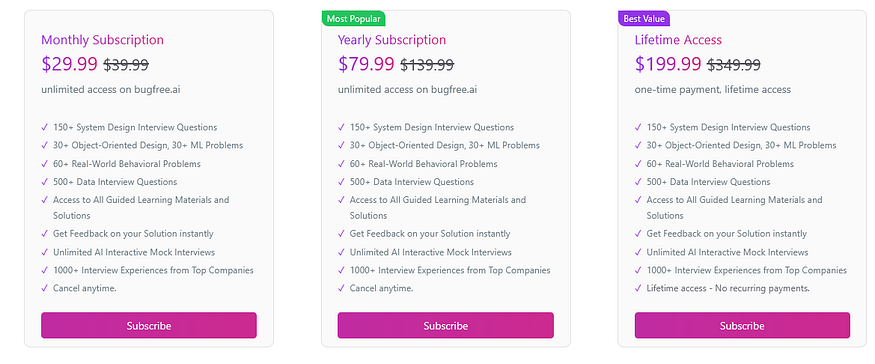
Key Differences: Bugfree.ai vs Codemia.io
here are the key differences between Bugfree.ai and Codemia.io which will help you to evaluate both platform better:
1. Focus
- Codemia.io: Specializes in System Design through active, hands-on practice.
- Bugfree.ai: Offers all-in-one interview preparation — covering system design, data interviews, and behavioral rounds.
2. Approach
- Codemia.io: Emphasizes iterative learning and deep skill development through repeated design and feedback loops.
- Bugfree.ai: Focuses on AI-driven mock interviews that simulate real interview environments.
3. Practice Format
- Codemia.io: Encourages you to write, design, and refine your own system architecture solutions.
- Bugfree.ai: Uses a Q&A interview simulation format to help you practice structured, time-bound responses.
4. Feedback Type
- Codemia.io: Provides detailed, actionable feedback highlighting scalability, fault-tolerance, and trade-offs.
- Bugfree.ai: Delivers evaluation-based feedback with performance scores, improvement notes, and AI insights.
5. Community and Resources
- Codemia.io: Includes peer solutions and community-driven learning, allowing you to view other engineers’ designs.
- Bugfree.ai: Offers 1000+ real interview experiences from top tech companies like Google, Meta, and Amazon.
6. Best For
- Codemia.io: Ideal for engineers who want to master system design through active, feedback-based practice.
- Bugfree.ai: Best for candidates who want to prepare for complete interview cycles, including data and behavioral rounds.
Here is also a nice comparison chart for Bugfree.ai vs DesignGurus.io, Educative.io, and geeksForGeeks
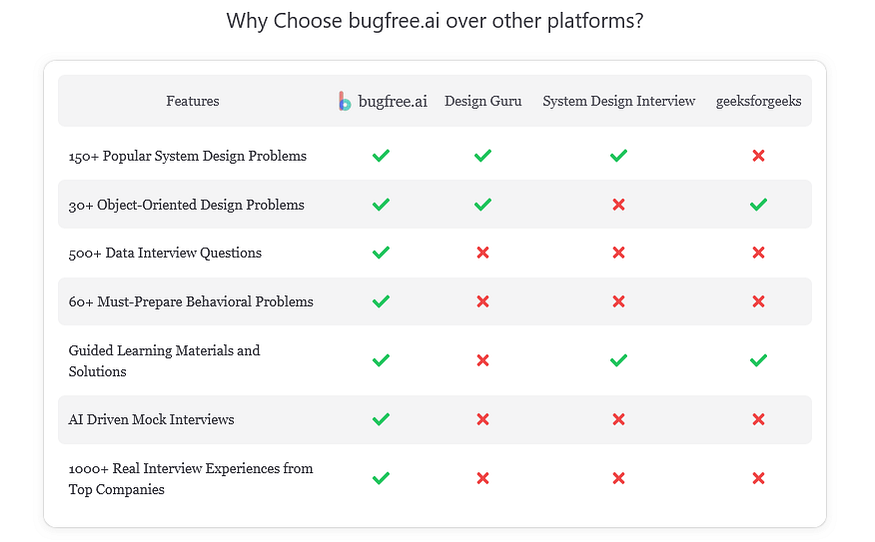
Which One Should You Choose in 2026?
While both the platform are great for System Design interview preparation, If your primary goal is to master the craft of system design — learning how to approach problems, structure solutions, and handle trade-offs — Codemia.io is your best bet.
It’s purpose-built for system design interviews and provides the depth and repetition needed to develop long-term intuition.
But if you’re looking for a broader, end-to-end interview platform that helps you prepare for all aspects of tech interviews — from system design to data and behavioral rounds — Bugfree.ai gives you that full-stack preparation experience.
In an ideal world, you’d use both: start with Codemia.io to build your foundation and practice designs actively, then move to Bugfree.ai to simulate real interviews and refine your answers.
Here is also a nice comparison chart of Codemia.io with other popular System Design interview prep platforms like DesignGurus.io and Educative.io etc
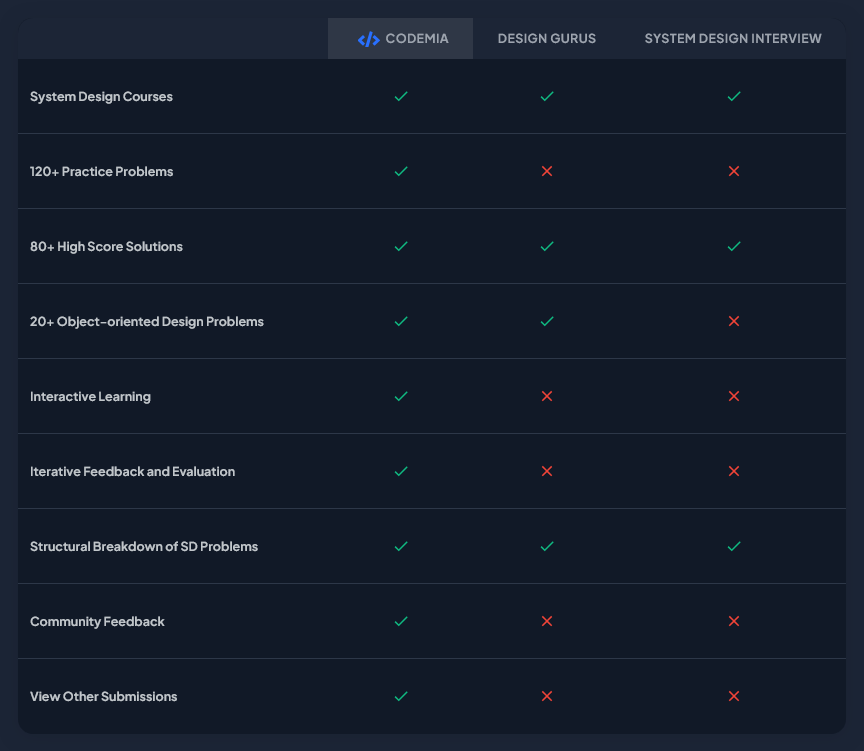
Final Verdict
While both Bugfree.ai and Codemia.io are great resources, if you have to choose between them, here are my 2 cents:
- Choose Codemia.io if you want to think like an architect and practice system design problems the way you practice DSA on LeetCode.
- Choose Bugfree.ai if you want to ace your interviews holistically — from system design to behavioral questions.
Both tools are revolutionizing how engineers prepare for interviews — and in 2026, AI-driven learning is no longer optional; it’s your competitive edge.
As I said, while I am a big ByteByteGo fan, I also use these platform to practice System Design problems which is missing on ByteByteGo, I am sure they will get that as well but until now, you need to combine ByteByteGo with one of these resources to prepare really well for System Design interviews in 2026.
Other Programming and Interview Articles you may like
- 20+ array-based Problems for interviews
- How Algomonster helped me to master DSA for interviews?
- 10 Best Courses to Learn System Design for Interviews
- 7 Best Courses to Learn Data Structure and Algorithms
- 25 Software Design Interview Questions for Programmers
- How to Prepare for Coding Interviews?
- 16 Best Resources for System Design Interview Prep
- Is DesignGuru’s System Design Course worth it
- Algomonster Review 2026 — Is it worth it?
- ByteByteGo vs NeetCode vs Educative? which one is better?
- Is ByteByteGo a good place for Coding interviews?
- 3 Free Books and Courses for System Design Interviews
- Is System Design Interview RoadMap by DesignGuru worth it?
- Is Exponent’s System Design Course worth it?
- LeetCode vs AlgoMonster? Which is better for Coding Interview?
- 10 Best Places to Learn System Design in 2026
- My Favorite Software Design Courses for 2026
- ByteByteGo 50% OFF? Should you Join?
- 10 Reasons to Learn System Design in 2026
- 100+ Coding Problems to Crack Your Coding Interview
Thanks for reading this article so far. If you like this article then please share them with your friends and colleagues. If you have any questions or feedback, then please drop a note.
P. S. — If you just want to do one thing at this moment, go join Codemia.io and start practicing System Design questions, you will thank me later. Make it a goal for the new year and you will surely be a better Software Engineer.









No comments :
Post a Comment